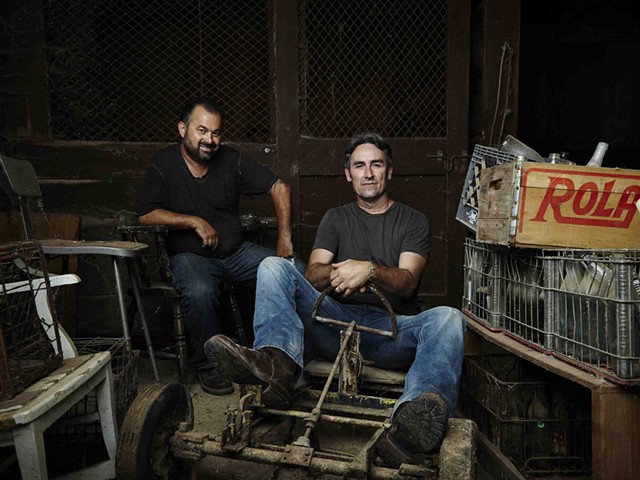
Courtesy photo.
Eric Thomas is a brand strategist and senior partner at Saga MKTG in Detroit. His column "Why I Hate Detroit" sparked a discussion when first posted Monday on LinkedIn.
“I hate Detroit.”
Out of all the opinionated and controversial things I say, this draws the most gasps and ire. It's usually in rooms surrounded by people who either don’t live in Detroit or have only lived here for less than five years. People usually fly into a similar line of questioning. “Why?” “Detroit’s great, it’s gritty and real.” “Detroit’s on the comeback, how could you say that?” And my utmost favorite, “Well, if you hate it so much, why don’t you leave?” The answers to these questions are both simple and complex.
Let’s start with the largest elephant in the room and work our way down. Detroit’s has very low opportunity for people that live here. Not none, just very minimal. There are tons of people with trust funds, cashed out retirement packages, and successful businesses in the suburbs that are moving in due to cost of doing business and asking me, “Whatever do you mean? Detroit is a millionaire's playground!?” True. If you can afford to take advantage of the economically depressed environment, then you’re in the luck. But say you’re an average Detroiter? Let’s look at some of the stats.
Number of people living under the poverty line: 39.3 percent.
Median household income: $25,000.
Single Parent Homes: 71 percent.
Unemployment rate: 10 percent (substantially better than the 28 percent from six years ago, but still twice as high as the national average).
Many longtime Detroiters lack the disposable income to “invest.” Granted, there have been valiant efforts to empower the Detroiters historically left behind by the gentrifying whirlwind of economic development.
Techtown, Motor City Match, the Detroit Land Bank’s program to buy your home, Southwest Solutions, and many others. Sue Mosey and many others are driving change in Midtown. And the most notably, downtown developments by Dan Gilbert, the DEGC, and the Detroit Downtown Partnership are infusing the economic core of Detroit with energy and all-around feel good vibes. But, as for the question of opportunity — let's examine what that really means.
Detroit’s educational system is screwed up. Now a topic of national debate, Detroit’s school system has been in shambles for decades. Even when I attended DPS in elementary school, we weren’t allowed to take books home. Kinda defeats the purpose of homework, right? The district has suffered from everything from lewd and illiterate school board presidents to greedy leadership.
We’ve had overpaid administration and underpaid teachers, and, in the most egregious sin of all, drastically underserved students. When the educational system is a joke, two opportunity gaps appear. The first is the most obvious. The students are at a deficit when it comes to being prepared for careers. But the second consequence — the worst in my opinion — is that they are perceived as a less desirable population to help or employ. From elementary to high school, they’ve been reduced to the sum of their test scores, and with the arts being cut from the classroom, any children with alternative aptitude are left to believe the overarching narrative. There is no place for them in the growing "knowledge-based" economy. Our kids don’t have an aptitude problem. They have an access problem.
When the world expects less from the youth, they typically only rise to lowered expectations.
Beyond that, the lack of outlets and recreation opportunities in Detroit is staggering. Whether you’re a kid or an adult, what is there to do?
To the person who knows every single $10-per-cup coffee shop and trendy restaurant that only serves chicken skins and not actual chicken (you know who you are) — simmer down.
Where would one go swimming, learn piano, play basketball (safely), be exposed to tennis, or join an athletic club? (I just learned athletic clubs were a thing while visiting the suburbs with my business partner.) It’s complicated to get a hamburger after 8 p.m. It’s damn near impossible to do anything after 8 p.m. that’s not "Hit the club" or turn your house into the club. And hell, even if you wanted to do things, how would you get there with the state of mass transit? That could be an entire blog on its own (full disclosure: I took the bus for years and had MANY negative experiences and a few cool ones). Which takes us to the point: If there is all this need, isn’t that an opportunity? Why doesn’t the market demand drive entrepreneurship?
Income per capita. Income per capita. Income per capita. We often talk about density when it comes to economic development, but we never talk about what the density should be comprised of. The median household income in Detroit is around $25,000 per year for a family of four. Half the national average. The census identifies us as the poorest big city in America. What does all this mean? It means that the soil isn’t fertile enough for small businesses to grow. As a small business owner who consults with many other small businesses, I see this firsthand.
With so many resources focused on entrepreneurship, the interest in starting a business is higher than ever. Unfortunately, the quest for customers remains exactly the same. With so few funds being stretched thin to take care of families, there is much less disposable income for patronizing local businesses. And what’s more important that patronization? Repatronization. Even if there's initial buzz and excitement around an opening, continuing to support a business becomes more than a typical Detroit family can afford to maintain. Most of the really successful businesses in Detroit service the surrounding areas. There are outliers, of course, like Kuzzo's. But one or two successes do not indicate fertile soil — they're simply more resilient than average plants.
And finally, what does all of this economic depression lead to? Detroit’s biggest issue: Crime. I do not believe the narrative of innate criminality that is spun to dismiss the needs of prominently black cities. Crime is usually about scarcity and survival. Without resources, you’re forced to find them wherever you can. From there, It grows into a lifestyle and becomes ingrained in the culture.
(Note: The ongoing perpetration of negative stereotypes in media and the glorification of thug life in hip-hop.)
Detroit is a case where this is most evident. On Joy Road and Greenfield, I grew up in one of the most dangerous areas in America. Not just locally, but in America. I have been nearly robbed, had friends shot — some fatally, others not — and had very unfortunate experiences with the police. Worse, my stories aren’t only common, they’re typical. Par for the course. This is a city so unappealing that even the police make sure to continue to lobby so they can live outside of the city.
"The disparity is starkest in cities with largely black populations. In Detroit, for example, 57 percent of black police officers live in the city, but just 8 percent of white ones do." — Nate Silver
If the people sworn to protect and serve don’t want their kids here, what hope do the rest of us have?
So, why do I stay? Because I love the people. I hate the place, but I love the people. I want to be a catalyst for growth and a beacon of opportunity for the next generation of Detroit-born leaders that need to know that there’s a better way.
When people say they love Detroit, I think they’re talking about the land mass. How else could you explain moving into a city and opening shops with price points too high for the residents to consume? Or transplanting large enterprises and only hiring Detroiters as security guards, to keep your old employees safe. To come downtown, only attend a Tigers game and claim you love the city seems disingenuous to me. How can people talk about Detroit grit, and not hire the people that made it gritty and survived? How can you cover up and prosecute graffiti artists and then import street artists from around the world to create a “local authentic feel?"
The 7.2 square miles often discussed is only 5 percent of the 142 that comprise Detroit. To say you love 5 percent of Detroit is like ordering a hamburger, eating the sesame seeds on the bun, and claiming you love hamburgers. No sir, you like sesame seeds. You love the Tigers. You love four miles of Woodward. But Detroit is not what you love.
Five years ago, nobody batted an eyelash when I said I hate Detroit. Now Shinola’s made it chic to wear the idea of it on your wrist. Complaining about Detroit has become almost as taboo as thinking about the children first when discussing DPS’s administration. I am a product of Detroit, and I’ve seen firsthand how bright and resilient the people are. There are diamonds littered throughout the landscape, and I’m not talking about historic homes. I’m talking about brilliant youth and passionate grassroots activists that have been doing the best they can with what they’ve been given. If we’re going to start talking about development, let's talk about human capital. Let’s stop doing the chic thing and pretending we “love Detroit,” and develop the Detroit that matters: The people.
Make a Difference
These are resources for people interested in getting involved to help the actual people. Some of these are clients of mine, and I'm proud to work with them. Do comment if you know of others — I’d love to add more people to this list.
Detroit Central City*
Southwest Solutions
Southwest Detroit Community Justice Center
Grow Young Talent
Techtown
Motor City Match
Cabrini Clinic*
Osborne Neighborhood Alliance
Motor City Blight Busters
New Era Detroit
Welfare Rights
Organizations starred* are my clients of mine.
Eric Thomas is a brand strategist and senior partner at Saga MKTG in Detroit.





